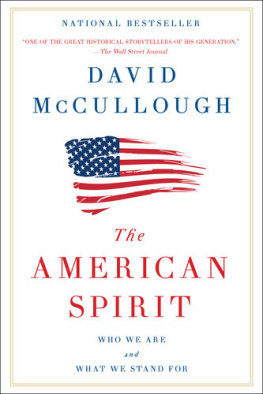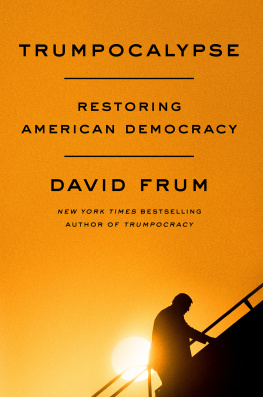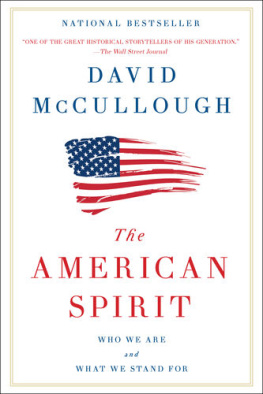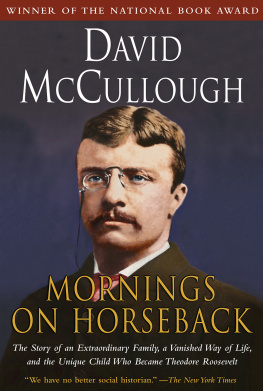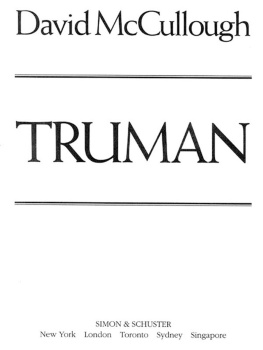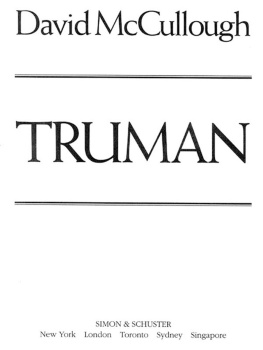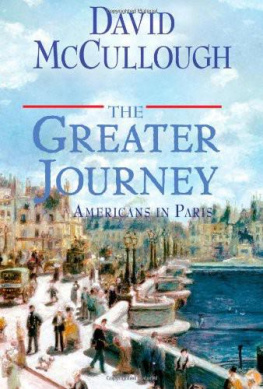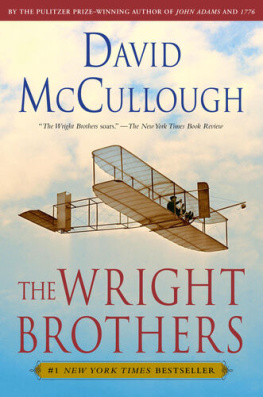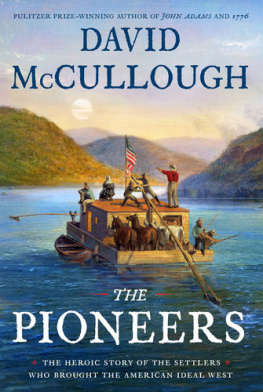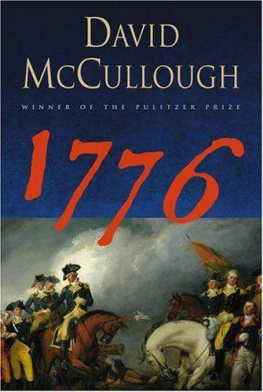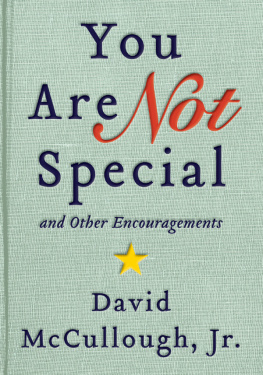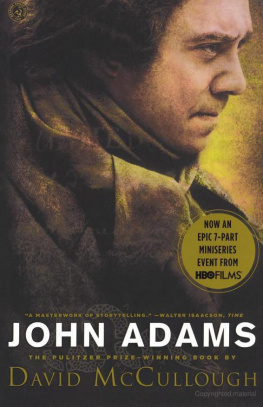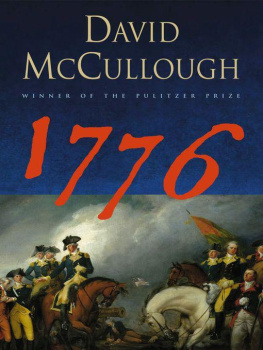David McCullough - Mornings on Horseback
Here you can read online David McCullough - Mornings on Horseback full text of the book (entire story) in english for free. Download pdf and epub, get meaning, cover and reviews about this ebook. year: 2019, genre: Non-fiction. Description of the work, (preface) as well as reviews are available. Best literature library LitArk.com created for fans of good reading and offers a wide selection of genres:
Romance novel
Science fiction
Adventure
Detective
Science
History
Home and family
Prose
Art
Politics
Computer
Non-fiction
Religion
Business
Children
Humor
Choose a favorite category and find really read worthwhile books. Enjoy immersion in the world of imagination, feel the emotions of the characters or learn something new for yourself, make an fascinating discovery.
- Book:Mornings on Horseback
- Author:
- Genre:
- Year:2019
- Rating:5 / 5
- Favourites:Add to favourites
- Your mark:
- 100
- 1
- 2
- 3
- 4
- 5
Mornings on Horseback: summary, description and annotation
We offer to read an annotation, description, summary or preface (depends on what the author of the book "Mornings on Horseback" wrote himself). If you haven't found the necessary information about the book — write in the comments, we will try to find it.
Mornings on Horseback — read online for free the complete book (whole text) full work
Below is the text of the book, divided by pages. System saving the place of the last page read, allows you to conveniently read the book "Mornings on Horseback" online for free, without having to search again every time where you left off. Put a bookmark, and you can go to the page where you finished reading at any time.
Font size:
Interval:
Bookmark:
sorry something went wrong loading your content. Check the table of contents or try paging forward. Or contact us at support@bookshout.com
sorry something went wrong loading your content. Check the table of contents or try paging forward. Or contact us at support@bookshout.com
Thank you for downloading this Simon & Schuster ebook.
Get a FREE ebook when you join our mailing list. Plus, get updates on new releases, deals, recommended reads, and more from Simon & Schuster. Click below to sign up and see terms and conditions.
CLICK HERE TO SIGN UP
Already a subscriber? Provide your email again so we can register this ebook and send you more of what you like to read. You will continue to receive exclusive offers in your inbox.
sorry something went wrong loading your content. Check the table of contents or try paging forward. Or contact us at support@bookshout.com
sorry something went wrong loading your content. Check the table of contents or try paging forward. Or contact us at support@bookshout.com
M Y FIRST ENCOUNTER with Theodore Roosevelt was in Pittsburgh about 1943. He was busy stealing the show in a Peabody High School production of Arsenic and Old Lace and I, at age ten or so, thought him sensational, and especially since in real life he was my oldest brother, Hax.
I have no idea how much or how little I knew of the historical TR before that night, but the impression that lasted was of a wondrously high-powered, comical, slightly loony, tremendously alive and appealing figure, all teeth, glasses, and mustache, who said Bully! at every chance and blew on a bugle and yelled C-H-A-R-G-E! at just the moment when it would bring the house down. I came away, in other words, with pretty much the impression of our twenty-sixth President that so many of us have grown up with, except that for me he happened also to be one of my very own family.
Years later, doing background reading on the Panama Canal, I encountered another Theodore Rooseveltstill the showman, still in command of the stage, but also shrewd, complex, a man of many gifts and masksand it was what I read of his early life in particular that led to this book. My intention was not to write a biography of him. What intrigued me was how he came to be. Having written about the creation of two of the most conspicuous inanimate wonders of his era, the Brooklyn Bridge and the Panama Canal, and having acquired as a result great appreciation for the simple idea that such things dont just happen, I was interested in knowing what was involved in the metamorphosis of this most conspicuous animate wonder. There were pieces of the puzzle that fascinated mehis childhood battle with asthma, for example, his beautiful southern mother, the adoration he had for his father. What, who, were involved in the forming of all that energy and persistence? How much of him was playacting or a composite of borrowings from others who were important to him?
The underlying theme would be the same as that of my earlier workthe creative effort, the testing and struggle, the elements of chance and inspiration involved in any great human achievement. The book would end when I thought he was formed as a person, at whatever age that happened, when I felt I could say, when the reader could say, there he is. San Juan Hill, the White House, the Canal, the trust-busting and Big Stick wielding, the Bull Moose with his hat in the ring, would all be after the fact, another story, so far as my interests.
But it was when I discovered the range and richness of surviving Roosevelt family correspondencethe many thousands of letters written not just by TR but by his mother, father, sisters, brother, grandmother, aunts, uncles, the private diaries and journals in the great Theodore Roosevelt Collection at Harvards Houghton Librarythat I realized what a truly marvelous and very large subject I had. The letters, only a small fraction of which have been published, offered the chance to get inside the life of a well-to-do Victorian American familya very particular and vanished way of lifeto go below the surface of their world, in a way that is seldom possible for a writer, except in fiction. It became the most engrossing work imaginable. The point that one of their number was to make history one day seemed almost immaterial. It was a story I would have wanted to tell had their names been something other than Roosevelt or had none of them done anything special later in life.
During all this period New York was very much in the condition described in Edith Whartons novel The Age of Innocence, writes Anna Roosevelt, Theodores older sister, in a private reminiscence that is part of the collection; though naturally I did not realize it at the time, she adds. Nor, importantly, did any of the family realize then that they were to be figures in history. The name Roosevelt was not yet a household word. National fame had not as yet touched any of the family and there was no reason to expect it might. And so there is an absence of affectation in almost everything they wrote to one another then, a wonderful candidness not always present in surviving correspondence from later stages.
Few of the Roosevelts could spell very well and punctuation for them, as for so many Victorians, was largely a matter of personal preference. Theodore, who graduated Phi Beta Kappa from Harvard, had the poorest spelling of all. He could handle hippopotamus or come close with antediluvian, even as a small boy, but words like Chicago or forest could prove too much for him. His brother, Elliott, had to write him at one point, As you dont know how to spell my name, I have entirely forgotten how to spell yourn. Ellio t does not spell Elliott, my dear Teedore.
So for the benefit of the reader, the spelling in the writings quoted here has been corrected and punctuation made to conform to present standards, except in a few instances where the idiosyncrasy adds to the spirit of what is being said.
The volume of published work one must become familiar with when dealing with even part of such a life as Theodore led is almost overwhelming. It is not just that so much has been written about him and about other Roosevelts, but that he wrote and published so much himself and read so much that had a direct bearing on his life. Though a bibliography and source notes are included at the back of the book, I would like to express my particular indebtedness to two published works from the 1950s: the monumental The Letters of Theodore Roosevelt (in eight volumes), edited by Elting E. Morison, John M. Blum, and John J. Buckley; and Carleton Putnams masterful Theodore Roosevelt: The Formative Years, 1858-1886. Numbers of other books were helpful and a pleasureHenry F. Pringles biased and lively Theodore Roosevelt, William H. Harbaughs The Life and Times of Theodore Roosevelt, which is much the best one-volume biography of TR, John Morton Blums superb The Republican Roosevelt, Hermann Hagedorns Roosevelt in the Bad Lands, Nicholas Roosevelts Theodore Roosevelt: The Man as I Knew Him but the Letters and the Putnam biography have been indispensable.
For his advice on research, his valuable comments on the manuscript, his friendship over the past four years, I thank especially Dr. John Allen Gable, Executive Director of the Theodore Roosevelt Association and author of the definitive The Bull Moose Years. I am also greatly indebted to Wallace F. Dailey, Curator of the Theodore Roosevelt Collection at Harvard, which in total comprises some seventeen thousand manuscript papers (mostly letters) and ten thousand photographs housed in the Houghton Library plus approximately twelve thousand volumes housed in the Widener Library. I thank Rodney G. Dennis, Curator of Manuscripts at the Houghton Library, and Martha Eliza Shaw and the others of the Houghton Reading Room staff who were so helpful. I salute, too, the resourceful John D. Knowlton of the Manuscript Division of the Library of Congress for his efforts in determining what was concealed beneath an ink blot in one of TRs diaries; I thank Timothy Beard of the New York Public Librarys genealogy division for sharing some of his latest findings on the remarkable private life of Robert B. Roosevelt. For the very thorough tour he gave me through TRs home at Oyster Bay, his quick and helpful answers to my written queries over the years, I thank Gary Roth, Curator of the Sagamore Hill National Historic Site.
Next pageFont size:
Interval:
Bookmark:
Similar books «Mornings on Horseback»
Look at similar books to Mornings on Horseback. We have selected literature similar in name and meaning in the hope of providing readers with more options to find new, interesting, not yet read works.
Discussion, reviews of the book Mornings on Horseback and just readers' own opinions. Leave your comments, write what you think about the work, its meaning or the main characters. Specify what exactly you liked and what you didn't like, and why you think so.

